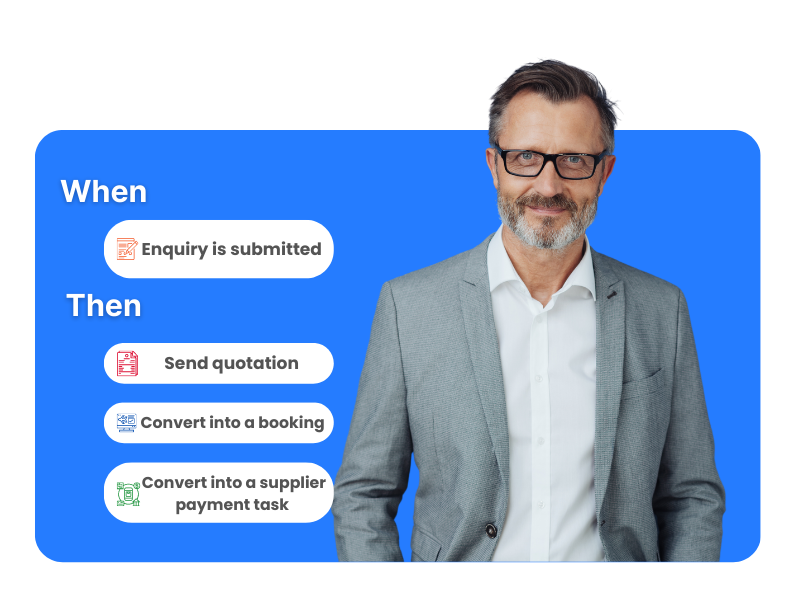
Travel Agencies
A platform specifically designed for you
Originally created as a tool for Travel Agencies, Zoomaworks is the all-in-one software that will take your business to the next level
The tools you need to put your customers at the heart of your business
Zoomaworks will help you satisfy your customers every step of the way


A tool built for an always-changing industry
We understand the challenges of the business scenario for travel agencies, such as increasing costs, customers going directly to suppliers, travel limitations, and fierce competition.
That is why we strive to provide you with the tools to make your business more efficient, organised, and better at closing sales.
Using the specialised tools built into Zoomaworks, stay in touch with your customers, integrate your teams and share information across departments.
We make it that simple.

Learn how travel agencies optimise their businesses with Zoomaworks

TIPS
How to become a Travel Agent?
Despite the popularity of automated booking systems for vacations, travel agents are still in demand for trips that require thoughtful planning and expertise. Travel agents ensure travel plans, such as activities and costs, receive a personalized touch while often providing clients with the best value for their money.
In this article, we explain what a travel agent does and how to become one, and we answer some common questions about this career path.
What do travel agents do?
Travel agents help clients make travel arrangements or explore different travel package options. They may suggest accommodations or destinations, and they can help clients arrange a travel itinerary. A travel agent can also book flights, hotels and reservations.
Before travel agents can make appropriate travel arrangements, they must learn important information about their clients, including budget, schedule, ideal vacation and preferred method of travel. For example, a travel agent who learns that a client is afraid of flying may suggest a cruise instead.
Read more: Learn About Being a Travel Agent
How to become a travel agent in 4 steps
Becoming a travel agent requires a certain level of education and training, and some may need to obtain certifications before they can begin working. Follow these steps if you’re considering a career as a travel agent:
1. Get formal training
Most travel agents need at least a high school diploma, but some college education can help you gain essential knowledge in areas such as tourism, best business practices, international affairs and marketing. You’ll need comprehensive knowledge—either firsthand or through a degree program—in these areas to provide your clients with travel plans and advice.
You could also pursue a travel agent certification to show your expertise to clients and potential travel agency employers. For example, The Travel Institute offers the Travel Agent Proficiency (TAP) test, which you can take to demonstrate your skills and qualifications as an accomplished travel agent.
After a few years of experience, you can take additional exams with The Travel Institute or similar organizations to earn more advanced certifications, such as becoming a Certified Travel Associate (CTA).
2. Develop your interpersonal skills
Part of a travel agent’s success depends on the ability to interact with others, whether it’s done by phone calls, emails or in-person meetings. Effective communication and interpersonal skills will help you gain and retain loyal clients, which is especially important if you plan to work independently and not for an agency.
Developing your soft skills so you can follow up on questions or communicate changes in a timely manner will also help you more easily negotiate with hotels and similar businesses to get the best deals for your clients.
3. Research planning and budgeting techniques
As a travel agent, your clients depend on you to help them save the most money possible while they travel. This is why it’s useful to research deals on local hotels, cruises, flights or events that may be offering special prices.
If you work for an agency, you’ll likely receive on-the-job training that shows how to quickly find the best deals for clients and make the best reservations for their value. It may be useful to get this experience before starting your own business.
4. Grow your travel industry knowledge
Vacation spots and your clients’ itinerary priorities will change over time, so it’s useful to keep a current and growing knowledge of new developments in the field. It can also help to continue taking courses specifically designed to help you gain a deeper understanding of the tourism industry.
In addition to the TAP test, The Travel Institute offers courses in subjects like geography and itinerary planning that equip you with the knowledge to plan memorable trips for your clients. These courses can be especially useful if you plan to specialize in one area of travel.
Soft skills, such as written and verbal communication, can help you find good deals while planning trips and booking flights and hotels. Time management skills are also essential in this career since you’ll likely be working with multiple clients or itineraries at once.
While it’s not necessarily required, it can give you a competitive advantage if you choose a particular specialty as a travel agent. For example, you could focus on planning trips for one geographic area, or you could specialize in a certain type of vacation. Gaining expertise in a specific area can also help you build a loyal client base.